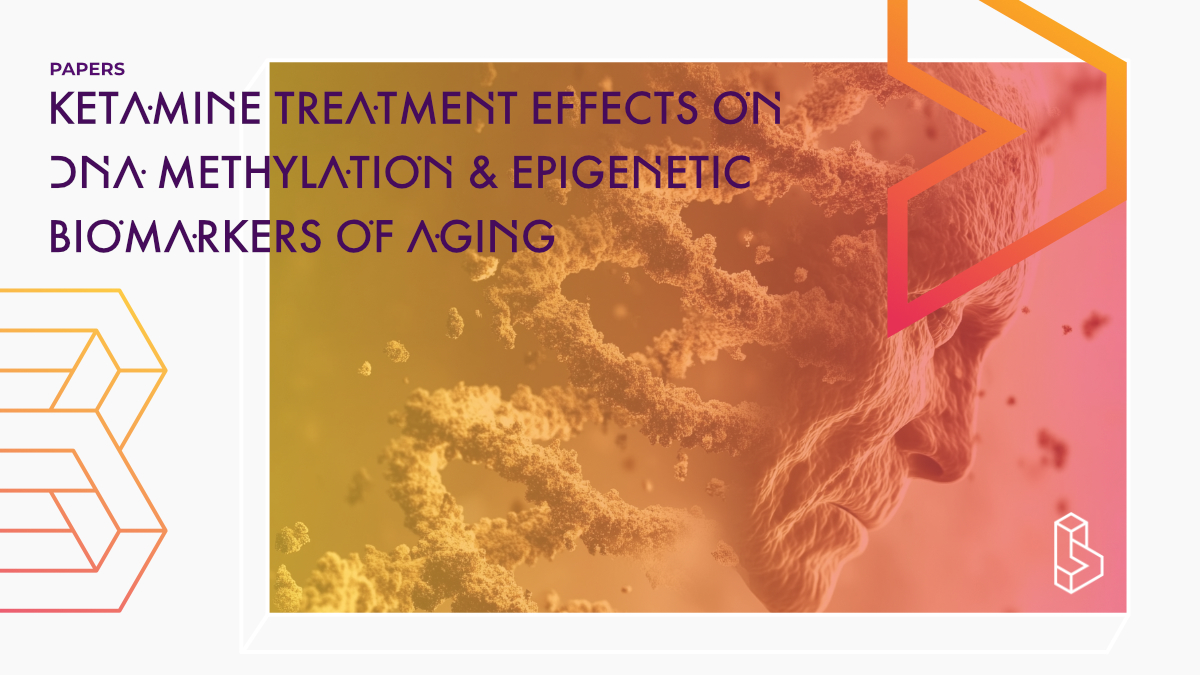This preprint open-label study (n=20) examines the effects of ketamine infusions (35mg/70kg, 6x) on biological ageing markers in individuals with depression (MDD) or PTSD. It finds reductions in epigenetic age as measured by OMICmAge, GrimAge V2, and PhenoAge biomarkers, as well as significant changes in Epigenetic Biomarker Proxies (EBPs) and surrogate protein markers following a 2-3 week treatment course. The study also reports expected decreases in depression and PTSD scores as measured by PHQ-9 and PCL-5.
Abstract of Ketamine treatment effects on DNA methylation and Epigenetic Biomarkers of aging
“Major depressive disorder (MDD) and posttraumatic stress disorder (PTSD) are debilitating psychiatric conditions associated with poor health outcomes similarly observed in non-pathological aging. Ketamine is a dissociative anesthetic and NMDA receptor antagonist with demonstrated rapid reduction in symptoms associated with Treatment Resistant Depression (TRD) and PTSD. Ketamine’s effects on biological aging have not been extensively studied among patients with moderate to severe symptoms of depression and/or trauma. To address this gap, this study looked at the changes in non-epigenetic measures, DNA methylation levels, immune cell composition, and biological age based on various epigenetic biomarkers of aging, of 20 participants at baseline and after completion of a 2-3 week treatment course of 0.5 mg/kg ketamine infusions in individuals with MDD or PTSD. As expected, depression and PTSD scores decreased in participants following ketamine infusion treatments as measured by the PHQ-9 and PCL-5. We observed a reduction in epigenetic age in the OMICmAge, GrimAge V2, and PhenoAge biomarkers. In order to better understand the changes in epigenetic age, we also looked at the underlying levels of various Epigenetic Biomarker Proxies (EBPs) and surrogate protein markers and found significant changes following ketamine treatment. The results are consistent with existing literature on ketamine’s effects on different biomarkers. These results underline the ability of GrimAge V2, PhenoAge, and OMICmAge in particular, to capture signals associated with key clinical biomarkers, and add to the growing body of literature on ketamine’s epigenetic mechanisms and their effect on biological aging.“
Authors: Kristin Dawson, Athena M. J. M. Carangan, Jessica Klunder, Natalia Carreras-Gallo, Raghav Sehgal, Samantha Megilligan, Benjamin C. Askins, Nicole Perkins, Tavis L. Mendez, Ryan Smith, Matthew Dawson, Michael Mallin, Albert T. Higgins-Chen & Varun B. Dwaraka
Summary of Ketamine treatment effects on DNA methylation and Epigenetic Biomarkers of aging
Major depressive disorder (MDD) and posttraumatic stress disorder (PTSD) are debilitating psychiatric conditions associated with poor health outcomes similar to those observed in non-pathological ageing. These conditions have been linked to increased risk for functional impairments, premature mortality, and various diseases including cardiovascular, cerebrovascular, and metabolic disorders.
In recent years, there has been growing interest in using various ageing-related biomarkers to quantify biological changes that occur as individuals age. These biomarkers include telomere length, immune cell proportions, and DNA methylation (DNAm) levels. Epigenetic clocks, based on DNAm, are commonly used biomarkers of ageing. First-generation epigenetic clocks predict chronological age, while second-generation biomarkers of ageing, such as GrimAge, OMICmAge, and DNAmPhenoAge, measure clinical features associated with ageing. The third-generation biomarker of ageing, DunedinPACE, predicts the rate of ageing rather than approximating biological age.
Previous research has used these biomarkers to investigate the impact of MDD and PTSD on biological ageing. Both conditions have been linked to multiple biomarkers of DNAm age acceleration and advanced DNAm age in blood. Epigenome-wide association studies have also demonstrated the involvement of differentially methylated genes in MDD in various age-related biological processes, including metabolism and inflammatory response.
Find this paper
Ketamine treatment effects on DNA methylation and Epigenetic Biomarkers of aging
https://doi.org/10.1101/2024.09.10.24313258
Open Access | Google Scholar | Backup | 🕊
Cite this paper (APA)
Dawson, K., Carangan, A. M. J. M., Klunder, J., Carreras-Gallo, N., Sehgal, R., Megilligan, S., ... & Dwaraka, V. B. (2024). Ketamine treatment effects on DNA methylation and Epigenetic Biomarkers of aging. medRxiv, 2024-09.
Study details
Compounds studied
Ketamine
Topics studied
Depression
PTSD
Neuroscience
Study characteristics
Open-Label
Bio/Neuro
Participants
20
Humans
Compound Details
The psychedelics given at which dose and how many times
Ketamine 35 mg | 6x
